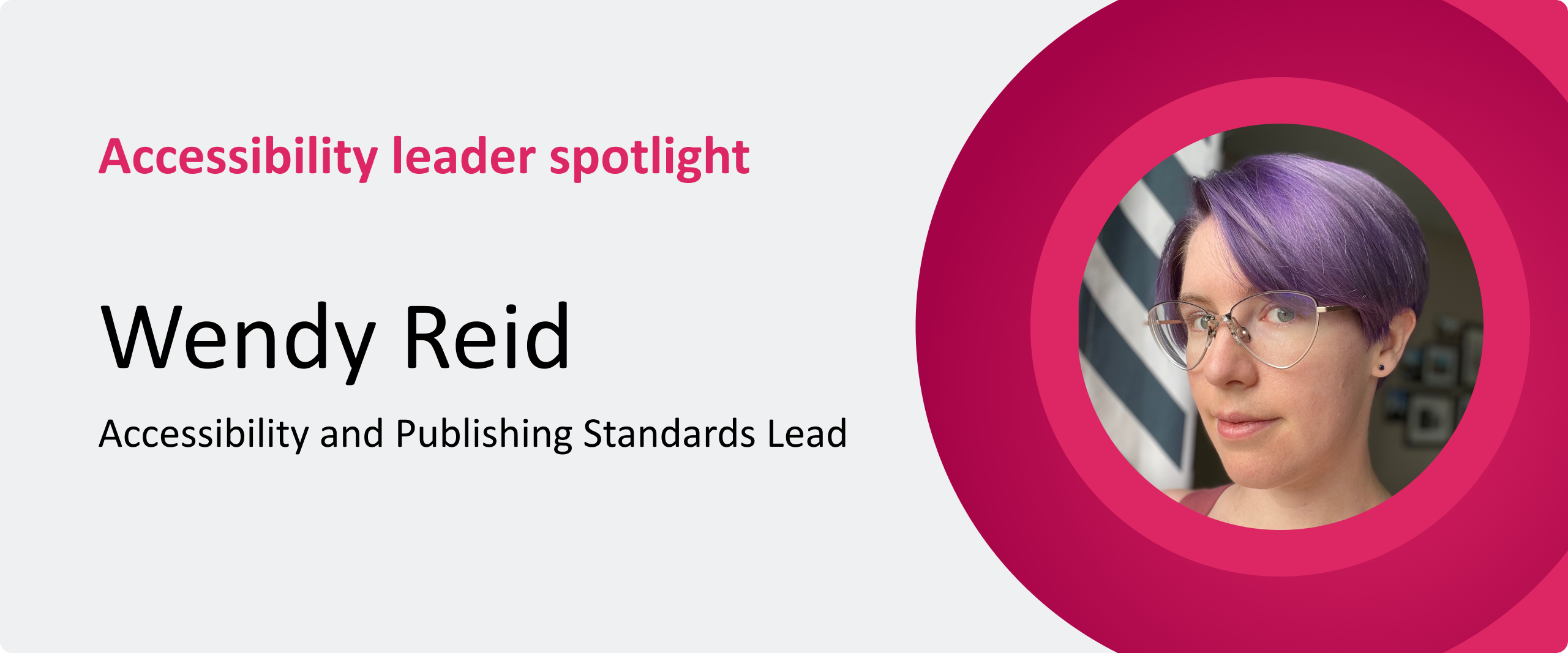
Accessibility leader spotlight: Wendy Reid
Accessibility and Publishing Standards Lead, Rakuten Kobo
Accessibility: the long and winding road
As with many accessibility practitioners, Wendy’s journey into tech was non-traditional. In fact, she has an English degree, and her original plan was to work in physical publishing. However, she quickly found herself working in quality assurance at Rakuten Kobo. As part of that work, she became involved with publishing standards for ebooks, and got to collaborate on standardization efforts by the W3C. While most known in the domain of web accessibility, the W3C is also involved in establishing accessible digital publishing standards applicable for formats like EPUB, the most common ebook format.
“When I was doing that work, I ended up meeting a lot of people from the publishing accessibility space. They told me: ebooks aren’t very accessible. Honestly, I had taken a lot of it for granted. I figured with the prevalence of computers and technology, we would have fixed a lot of these problems, right?” But in truth, the main retailers – theirs included – were not producing accessible reading experiences.
Shocked by what she was hearing, and knowing she could make a real difference, Wendy went to her manager and asked to spend ten percent of her time on accessibility. This small commitment would rapidly grow into a full-time career for her, leading to her current role as Kobo’s Accessibility and Publishing Standards Lead.
Building a program
“I started by getting us to conformance. But then I thought, no, we can do more. And I’ve spent the last couple of years really thinking about the ways we can further publishing accessibility. How can we make the website more accessible, the apps more accessible? It’s a huge opportunity. What new audiences can we reach? What new use cases can we create for the world?”
While Kobo has always talked about features of ebooks that make them more customizable, they didn’t start off by working on accessibility directly. Wendy has had the chance to build the accessibility program at Kobo, by seeking out and taking advantage of new opportunities, these efforts have made their products better for everyone.
Fable: test the hypothesis
“I tell my coworkers this all the time. We can’t make assumptions. We have to make a hypothesis, and test it. We have to be prepared: our hypothesis might be completely wrong.”
Wendy works with Fable’s community to do more than verify basic accessibility. Through Fable Engage, Wendy is able to:
- consult with native assistive technology users during exploratory research, to learn what users want from an ebook reader
- test prototypes to find out what accessibility techniques might work well in the space
- collect feedback on experiences already in production, to learn what her team can do to make ebooks more usable for as many people as possible
“I’m doing some work right now with [ebook] annotations. Fable lets me just ask a bunch of people about annotations and find out what they’re doing. Now I know which direction we want to start moving towards because we have all this information.”
Fable also allows Wendy to do targeted explorations. Unlike with a large survey or report, Wendy can reach out to users of a specific assistive technology, with a specific question, and quickly find answers. “Fable allows us to get different users, from different places, with different relationships with books,” she says, “and that can be hard to find anywhere else.”
Ultimately, Fable allows Wendy to come to internal discussions involving product managers, designers, and developers armed with videos of real users, and data about what’s working well, what isn’t, and recommendations for the best way to move forward. “The most impactful way to get people on my side,” she says, “is to have a video of someone actually using something.”
“I tell my coworkers this all the time. We can’t make assumptions. We have to make a hypothesis, and test it.”

Wendy Reid
Accessibility and Publishing Standards Lead

